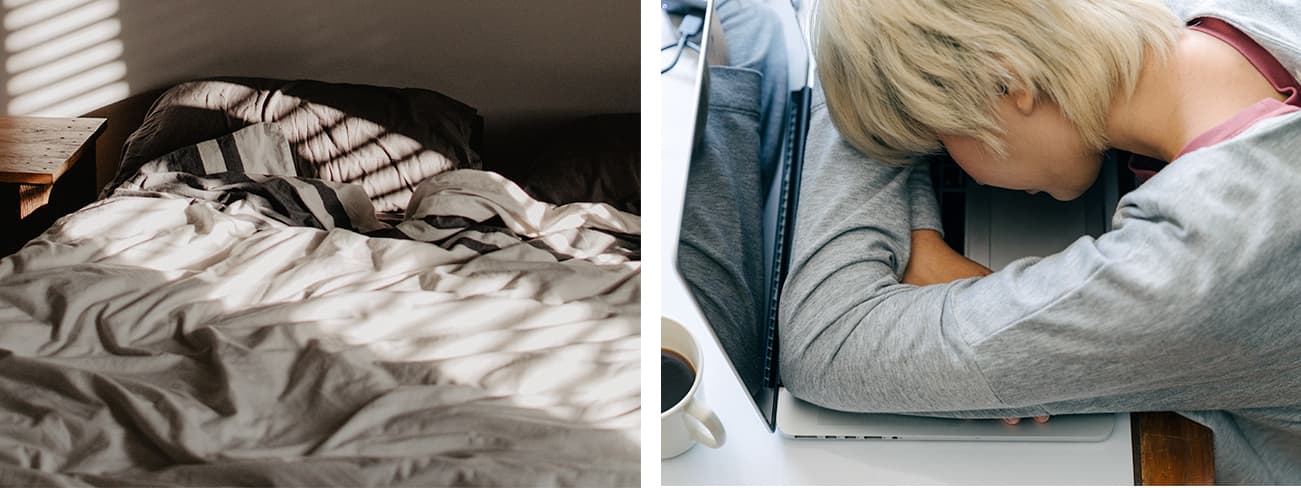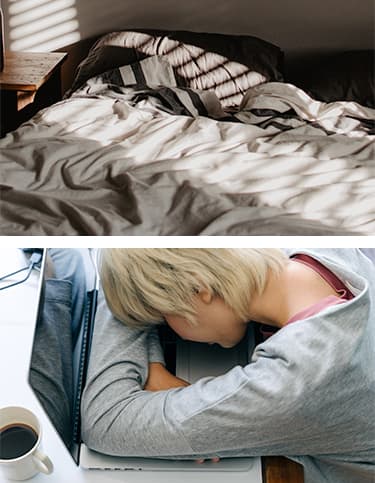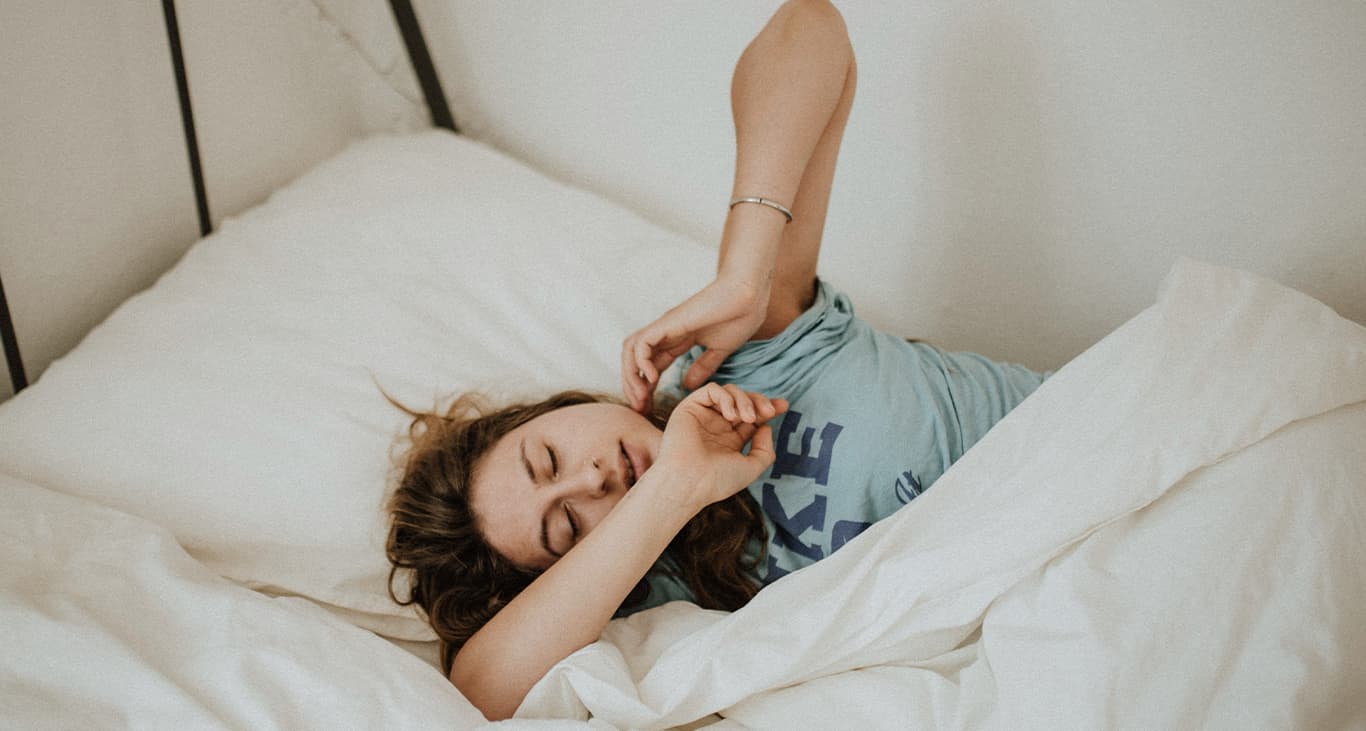The Mental Health Effects of Sleep Deprivation in College Students
Reading Time: 4 minutesCollege and sleep deprivation are known to go hand in hand. But pulling all-nighters doesn’t just leave young people yawning in class—it may also significantly reduce their well-being. Sleep deprivation in college students and other young adults may be contributing to the current mental health crisis among this age group.
Sleep Deprivation in College Students: Statistics and Research
How much sleep do young adults need? Seven to nine hours each night, according to the National Sleep Foundation. But for college students, coursework, socializing, and other on-campus activities often prevent them from getting enough Zs. By some estimates, between 70 and 96 percent of college students are getting less than eight hours of sleep each weeknight, and 50 percent are getting fewer than seven hours.
Technology plays a large part when it comes to sleep deprivation in college students. Late-night studying, video games, social media, texting, and watching TV can disrupt the circadian rhythm—the body’s internal clock. Furthermore, a recent study of 1,200 young adults found that 41 percent of females and 42 percent of males suffer from at least one sleep disorder, such as sleep apnea, chronic insomnia, or restless legs syndrome.
According to the Sleep Cycle study, these are the top reasons for sleep deprivation in college students and other young adults:
- Technology use—blue light from screens blocks the release of melatonin, which makes sleeping more difficult
- Less time in natural light, which interferes with the sleep cycle
- Reduced exercise
- Drinking alcohol, leading to awakenings throughout the night
- Feelings of anxiety, depression, and loneliness that keep young adults from falling asleep—increasing “sleep onset latency,” the period between being fully awake and asleep, which is critical to overall sleep health.
Know the Facts
Even in young adults with no mental health disorders, missing out on sleep can cause immediate consequences like irritability, difficulty in memory or focus, and behavioral issues.
The Relationship Between Sleep Hygiene and Mental Health
Sleep disturbances are a well-known side effect of most mental health disorders. Sleeping too much, being unable to sleep, needing very little sleep, and other sleep issues can be manifestations of mental health challenges, ranging from mild depression to psychotic episodes. Sleep, or the lack thereof, is an important indicator of whether a young adult is suffering from a mental health disorder.
Sleep deprivation and depression in young adults are closely related. Not getting enough sleep can exacerbate or trigger depressive symptoms, while difficulty sleeping can be a symptom of depression or another mental health issue. The Sleep Cycles study found that participants with mental health concerns have a much harder time falling asleep. Among those with depression, 60.4 percent reported taking longer than usual to fall asleep, while 53.4 percent of those with anxiety took longer to fall asleep.
Long-Term Effects of Sleep Deprivation in Young Adults
Over time, the effects of sleep deprivation in college students and other young adults can have a serious impact on mental and physical health. One study of 20,000 young adults found that each hour less of sleep increased the risk of psychological distress, while long sleep duration showed no association with distress.
Prioritizing sleep may be one of the most expedient pathways to mental and emotional health during troubling times.
Dr. Rebecca Robbins, PhD
Brigham and Women’s Hospital and Harvard Medical School, collaborator on the Sleep Cycles study
In addition, when an individual is deprived of sleep for an extended period, the risk increases of having physical health problems such as cardiovascular disease, weight loss or gain, Type 2 diabetes, and elevated cholesterol. Additionally, sleep disturbances are linked to high-risk behaviors, such as drug or alcohol use, having unprotected sex, and self-harm.
Therefore, sleep is vital for college students and for all young people—and for those with mental health conditions, sleep is even more crucial. Recent research has determined that good sleep can help prevent episodes of depression and anxiety and help maintain good mental health. When combined with medical care and psychotherapy, healthy sleep practices can decrease the frequency and severity of symptoms.


7 Tips for Good Sleep Hygiene
Sleep hygiene and mental health are closely linked, because sleep is essential to young adults’ mental and physical well-being. Getting the right amount and quality of sleep can be a powerful protective factor against anxiety and depression.
To establish healthy sleep patterns, young adults can follow these tips for good sleep hygiene:
- Turn off tech devices at least one hour before bedtime
- Go to bed around the same time every night
- Maintain a similar bedtime routine each night
- Avoid caffeine, especially after lunch
- Don’t take naps during the day
- Wake up at the same time each morning.
- Do some form of vigorous exercise, even if it’s brief.
While these daily self-care tips benefit all young adults, those struggling with mental health challenges may see significant benefits when they add healthy sleep routines to their treatment protocols.
To find out more about how Newport Institute’s clinical model incorporates sleep, nutrition, and other integrative approaches into our evidence-based young adult treatment, contact us today.

